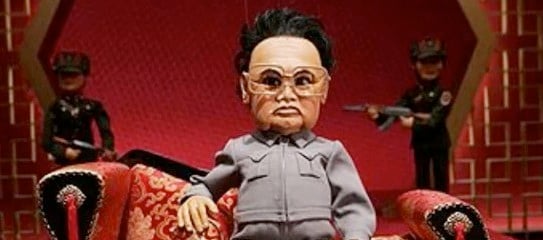Kim Jong Il: ‘so ronery’
To the West, the North Korean dictator was mostly a collection of stereotypes in a puppet movie
Share
 As many jokes and YouTube links made clear last night, Kim Jong Il’s image in the West comes largely from a puppet movie that he probably shouldn’t even have appeared in. The movie was Team America: World Police, a film made in 2004 by South Park (and later, Book of Mormon) creators Trey Parker and Matt Stone as their comment on the War on Terror, back before we completely won that thing. Kim was the villain that the titular Team went up against, plotting to unleash terrorism upon the world with the unwitting help of useful idiots like actor Matt Damon and U.N. weapons inspector Hans Blix.
As many jokes and YouTube links made clear last night, Kim Jong Il’s image in the West comes largely from a puppet movie that he probably shouldn’t even have appeared in. The movie was Team America: World Police, a film made in 2004 by South Park (and later, Book of Mormon) creators Trey Parker and Matt Stone as their comment on the War on Terror, back before we completely won that thing. Kim was the villain that the titular Team went up against, plotting to unleash terrorism upon the world with the unwitting help of useful idiots like actor Matt Damon and U.N. weapons inspector Hans Blix.
The choice of Kim as the villain, like so many of Parker and Stone’s choices, got them attacked for a failure of nerve on both sides of the political aisle. For liberals, the presence of Kim seemed like an attempt to avoid taking a stand on the Iraq war (though since the war started while the film was in development, it might not have been possible to make the movie about Saddam Hussein). For conservatives, it was sidestepping the issue of Islamist terrorism. But for Parker and Stone, the reason for the choice may have been a simple one: they find stereotypes really funny, and the character of Kim Jong-Il allowed them to dig up every possible stereotype and build scenes around them. The dictator’s big song is called “I’m So Ronery,” and it was that song, and clip, that made the rounds on social media yesterday night.
That makes Team America less of a throwback to the days of the War on Terror—about which it doesn’t always have a whole lot to say—or to Kim’s own dictatorship. It’s a throwback to the heyday of a certain type of offensive comedy, when the backlash against ’90s political correctness had led to the gleeful revival of a whole host of stereotypes, almost as meta-commentaries on our own discomfort with them. In the last few years, the pendulum has swung again (thanks to Michael Richards and others who demonstrated that “shock laughs” aren’t very funny a lot of the time), so this kind of humour might not fly as easily in a movie today. But that may be Kim’s greatest legacy in the West: as a marionette representative of a brief period where stereotyping was funny again.
As for Kim himself, he doesn’t seem to have realized that his presence in the film didn’t have much to do with him. All he and his representatives knew was that the decadent West was making fun of him. In early 2005, the North Korean embassy in Prague accordingly demanded that the country’s government ban the film: “Such behaviour is not part of our country’s political culture,” the ambassador said of Kim’s singing, terrorism and puppetry. A spokesman for the Czech ministry told the CBC that this was an “unrealistic wish.” Give that to Team America: it gave people a chance to be very deadpan and diplomatic about a crazy real-life government.